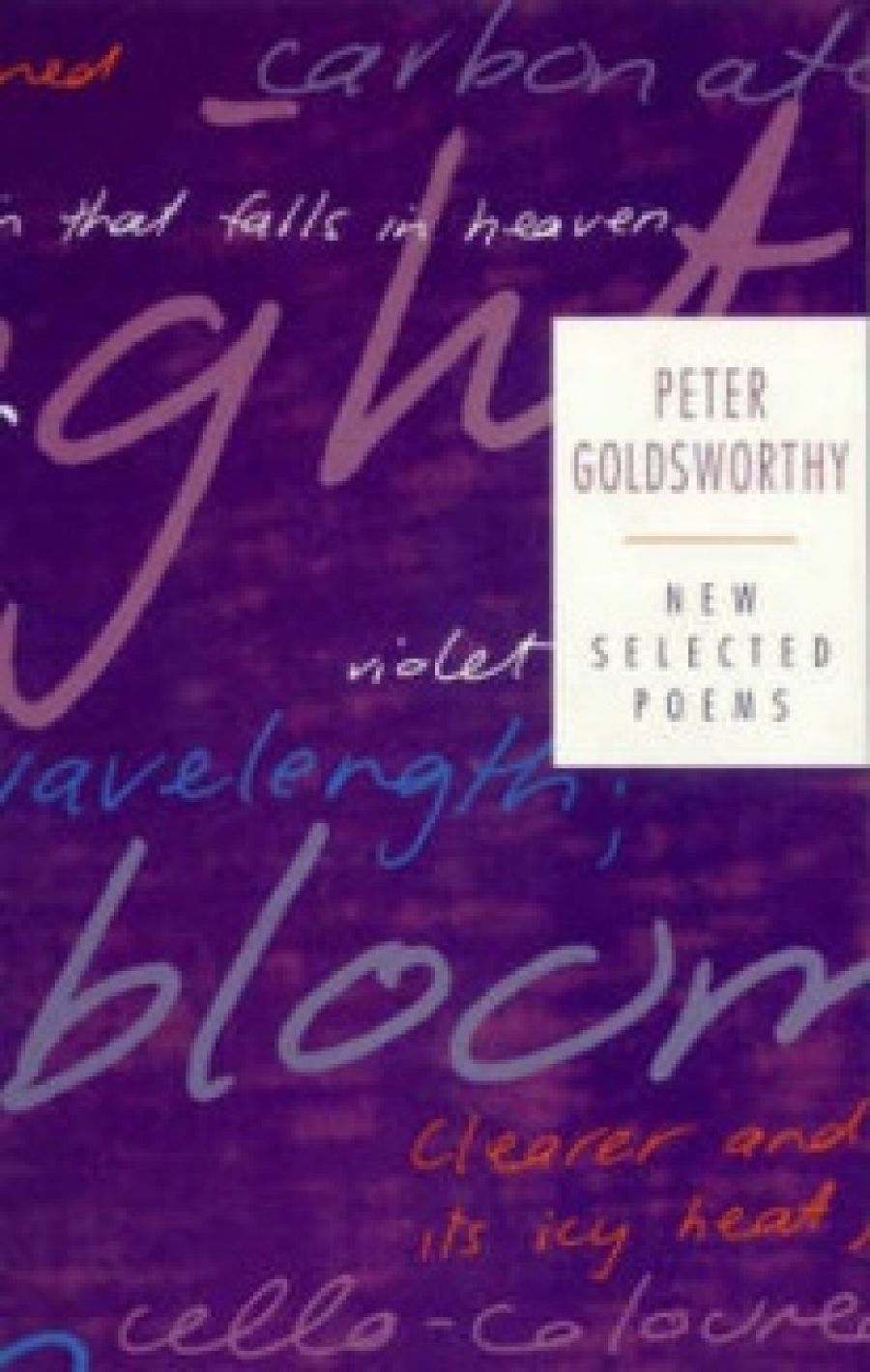
- Free Article: No
- Contents Category: Poetry
- Review Article: Yes
- Online Only: No
- Custom Highlight Text:
Peter Goldsworthy, doctor and poet, is a writer of significant style and concision. This new selection of his lyric poetry lives up to its jaunty, graffitied, lavender cover; it bespeaks lightness. And lightness is damned hard work. You don’t get there just by smiling and going to book launches ...
- Book 1 Title: New Selected Poems
- Book 1 Biblio: Duffy & Snellgrove, $22 pb, 148 pp, 1 875989 90 0
The only editorial mistake was to include, in the cold light of print, thirteen songs from the Richard Mills opera Batavia. Goldsworthy’s libretto for this gripping musical drama, this bloody narrative of our far west, was an unquestionable triumph, giving the opera remarkable traction and attraction. But what works on the singing stage may look very different in a book: we don’t even read da Ponte for the impact of his poetry. And these lyrics come across now in a sort of archaic fustian. Perhaps excitement over the opera’s success brought in these pieces, which are so at odds with the poet’s comic spirit. Alas, they are marooned so far from the quick, shapely wit that reigns over the rest of New Selected Poems. Elsewhere in this collection, ‘every poem is an answer to the question what poetry is for’, in the words of Jamie McKendrick. The poems dart about, scoring at will.
Few Australian poets are light in this way; perhaps Evan Jones is the closest. Despite their different formal stances, both Goldsworthy and Jones skate along on the sureness of a really good ear. Either could have written, ‘I needed to pray but felt / embarrassed: what if / Someone was listening.’ That capital S is exquisite.
Such a quip about the absent or present God takes us back to the heart of jokes and their significance. In his fine study of oral humour, Freud noted that jokes are marked by condensation, repetition and double meaning. Unlike pure/impure writers of light verse, that ostensibly minor discipline, Peter Goldsworthy (what a deeply Australian name to have to repeat!), makes no use of repetition, but condensation and duplicity lie coiled at the heart of his clever art.
In the face of our universal doom, since the undiagnosed expulsion of Eve and Adam, the poet’s response is that recommended by Freud: ‘The insult must therefore, it would seem, be swallowed in silence. But fortunately a joke shows the way in which the insult may be safely avenged — by making use of the technical method of unification in order to take up the allusion and turn it back against the aggressor.’ The aggressor, in this case, is life itself but, with his medical training, Goldsworthy has already blunted the assailant’s blade. He is left with wit and tone, ‘walking through Scenery’, as he puts it with another naughty capital S. And how concisely he does it, a lesson to us all, in a certain mood, anyway: he just glides by, like Stevie Smith on a skateboard, or perhaps like Gianfranco Zola in full flight along the wing.
No wonder, then, that this cavalier-poet includes a lyric called ‘Jokes’, an almost bitter sop to throw in the mouth of Cerberus, pinning him down at the smoky entrance, with the deeply Goldsworthian line, ‘There are only four jokes anyway’.
Funny about that. I thought there were three.
With Forbes gone to the great New York beyond us all, and Laurie Duggan silent or gone artistic, we must turn to Peter Goldsworthy with the bow of respect that Dryden offered to Congreve, saying, ‘But shade those laurels which descend to you’. And it is possible, now that two operas are behind him, that this poetical descendant may also turn increasingly to the stage and its vigorous effects of sound and gesture.


Comments powered by CComment